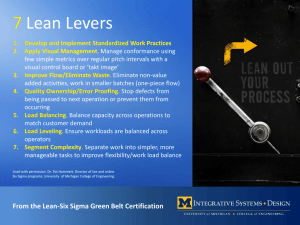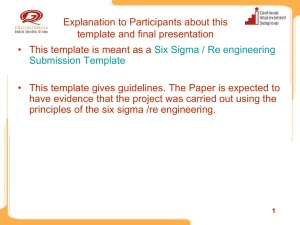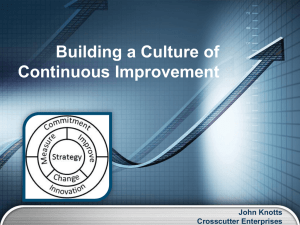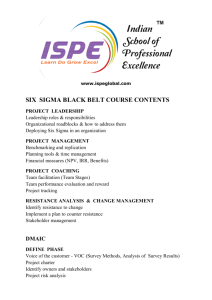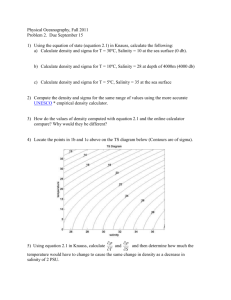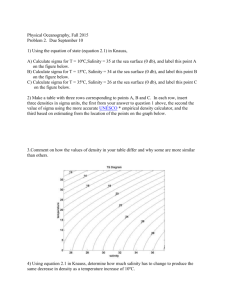Six Sigma Project Launch Plan Template
advertisement
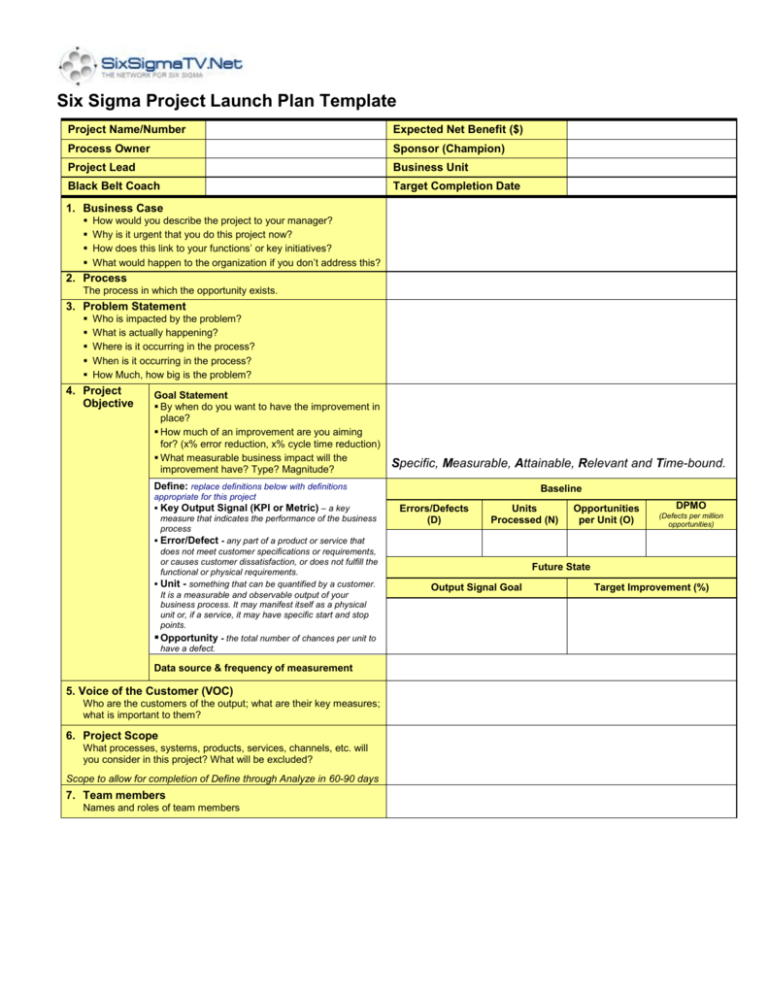
Six Sigma Project Launch Plan Template Project Name/Number Expected Net Benefit ($) Process Owner Sponsor (Champion) Project Lead Business Unit Black Belt Coach Target Completion Date 1. Business Case How would you describe the project to your manager? Why is it urgent that you do this project now? How does this link to your functions’ or key initiatives? What would happen to the organization if you don’t address this? 2. Process The process in which the opportunity exists. 3. Problem Statement Who is impacted by the problem? What is actually happening? Where is it occurring in the process? When is it occurring in the process? How Much, how big is the problem? 4. Project Objective Goal Statement By when do you want to have the improvement in place? How much of an improvement are you aiming for? (x% error reduction, x% cycle time reduction) What measurable business impact will the improvement have? Type? Magnitude? Specific, Measurable, Attainable, Relevant and Time-bound. Define: replace definitions below with definitions appropriate for this project Key Output Signal (KPI or Metric) – a key measure that indicates the performance of the business process Error/Defect - any part of a product or service that does not meet customer specifications or requirements, or causes customer dissatisfaction, or does not fulfill the functional or physical requirements. Unit - something that can be quantified by a customer. It is a measurable and observable output of your business process. It may manifest itself as a physical unit or, if a service, it may have specific start and stop points. Opportunity - the total number of chances per unit to have a defect. Data source & frequency of measurement 5. Voice of the Customer (VOC) Who are the customers of the output; what are their key measures; what is important to them? 6. Project Scope What processes, systems, products, services, channels, etc. will you consider in this project? What will be excluded? Scope to allow for completion of Define through Analyze in 60-90 days 7. Team members Names and roles of team members Baseline Errors/Defects (D) Units Processed (N) Opportunities per Unit (O) DPMO (Defects per million opportunities) Future State Output Signal Goal Target Improvement (%) 8. Principal Stakeholders Who are the approvers of team decisions, resource of subject matter experts, or interested party who needs to be kept informed? 9. Project Timeline Key milestones/dates for each phase Project Start Define Complete Measure Complete Analyze Complete Improve Complete Control Complete Implement Complete 10. Additional Support Required Are any special capabilities, hardware, trials, etc. needed? Start Point: Project Identification Stop Point: Project Completion Process Owner/Sub-Process Owner Identifies project opportunity through use of Pipeline Reports, Business Plans, Process Dashboards, etc. Quantifies financial benefit of the project Identifies Project Lead Determines if Six Sigma training is needed Assists Lead in completing Project Launch Plan and Project Charter Assists Lead in validating Project Charter Administers regularly scheduled project reviews Drives overall project execution (or cancellation) Project Lead (can be dedicated Six Sigma resource or business resource) Completes Project Launch Plan and Project Charter; reviews with Process Owner Leads project from Define through Deploy Understands and applies proper Six Sigma tools and methodology to their project Plans and performs data collection and analysis Seeks Process Owners direction and support when necessary Initiates meetings with the coach to review progress and receive just in time coaching Gives project status at project reviews Six Sigma Black Belt Coach/Mentor (dedicated Six Sigma resource) As required, provides the following skills to support the Project Lead: Assists Lead in completing Project Launch Plan prior to Six Sigma training Assists Lead in structuring or breaking down tasks into manageable assignments to be done between their meetings Assures the rigor and discipline of the Six Sigma methodology are applied appropriately by the Lead Provides just in time training of quality tools and helps guide Lead’s efforts when statistical expertise is needed Helps Lead decide what data will be useful and how best to gather the data Advises Lead on project progress, deliverables/milestones and next steps Reviews Lead’s project template for completeness and proper use of quality tools Prepares Lead for project reviews
